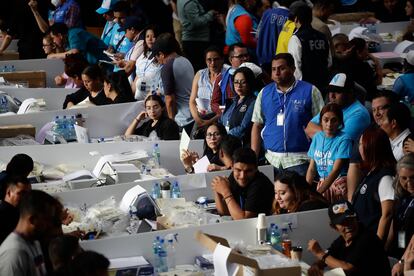Making elections meaningful for people
Some 3.7 billion people across more than 70 countries are heading to the polls this year as democracies struggle against high levels of mistrust, misinformation and electoral violence

Global media have focused on 2024 as the “super year of elections,” with some 3.7 billion people across more than 70 countries heading to the polls. Elections are high stake events which require significant investment so people can exercise their political voice, choose their representatives, and hold public officials accountable.
About one out of every four countries in Latin America and the Caribbean will hold an electoral process this year, providing more than 140 million people the opportunity to indicate their preferences, with the potential to reshape the political landscape in the region.
National or local elections taking place against a backdrop of high levels of distrust in public institutions and politicians globally, dysfunctional governance, extreme levels of information pollution, disregard for rule of law, and a weakening of independent institutions may not deliver the outcomes that matter to people. Disinformation coupled with offline and online electoral violence are decimating citizens’ trust in electoral processes, further accelerating concerns of democratic backsliding.
Voters expect that their views are represented, that elected representatives will deliver what they have promised, and that people can hold elected officials accountable when they do not deliver.
There is no doubt that democracy as an ideal retains high levels of support globally. Some 81% of people interviewed by the last round of the World Values Survey said that living in a democratic country matters. Similarly, the Open Society Foundations’ survey of over 36, 000 respondents from across 30 countries found 80% wanted to live in a democracy.
However, dissatisfaction with the actual functioning of democracy is growing. A recent global survey found high levels of disillusionment among younger people about the point of elections. Young people around the world hold the least faith in democracy of any age group and do not trust politicians to tackle issues related to the climate crisis and rising income inequality.
Robust democratic governance that can deliver for people
Resilient democracies require good governance which cannot be created overnight but is built on accountable social and political institutions, with norms, values and a culture based on respect for human rights. We have seen numerous examples of how bad governance can limit human development, inhibit economic progress, and contribute to suffering and abuse.
In some contexts, this disaffection has fueled the increased incidence of violent political expression and coups. Indeed, in September 2021, the U.N. Secretary-General stated with concern that “coups are back.” Elections alone will not deliver the things people care about and build trust in public authority — the foundation of democratic institutions also has to be strong. Experience has shown that for elections to matter to people, they need to be part of a strong democratic governance system in which people experience the rule of law, with institutions which provide “checks and balances” on the use of power and curb corruption. People also require reliable information and opportunities to make their voices heard on issues that matter to them in between elections, as well as access without discrimination to quality public services.
As one of the largest providers of electoral assistance, UNDP plays a key role in supporting peaceful, credible and inclusive electoral processes as a cornerstone of democracy and as part of broader support to democratic governance. UNDP together with the U.N. System is providing technical assistance to about 20 countries that will or may hold elections in 2024. With an investment of €8.5 million ($9.16 million) since 2021, UNDP and the Spanish Agency for International Development Cooperation (AECID) have established a global partnership for electoral assistance to make elections more inclusive, trustworthy, and safer in 21 countries in Africa, Latin America, and Asia and the Pacific. This work is focused on preparing electoral management bodies for new risks, such as disinformation and digital violence; strengthening the capacity of historically excluded populations to participate effectively in electoral processes; and enhancing whole-of-society responses to promote information integrity.
This July, the U.N. High Level Political Forum (HLPF) will review in-depth Sustainable Development Goal (SDG) 16 — which focuses on many of the core elements of democratic governance, promoting peaceful, just and inclusive societies. The Global Progress Report on SDG 16 cautions that progress on SDG 16 is worryingly slow and in some cases, it is even moving in the wrong direction. Forty countries, eight from Latin America and the Caribbean, will be presenting their national reviews on progress on the SDGs including SDG 16.
As we stand in the first quarter of this “super-year of elections,” it is imperative to invest in resilient systems of democratic governance, so people see their vote as meaningful and contributing to the outcomes they care about.
Sign up for our weekly newsletter to get more English-language news coverage from EL PAÍS USA Edition
Tu suscripción se está usando en otro dispositivo
¿Quieres añadir otro usuario a tu suscripción?
Si continúas leyendo en este dispositivo, no se podrá leer en el otro.
FlechaTu suscripción se está usando en otro dispositivo y solo puedes acceder a EL PAÍS desde un dispositivo a la vez.
Si quieres compartir tu cuenta, cambia tu suscripción a la modalidad Premium, así podrás añadir otro usuario. Cada uno accederá con su propia cuenta de email, lo que os permitirá personalizar vuestra experiencia en EL PAÍS.
¿Tienes una suscripción de empresa? Accede aquí para contratar más cuentas.
En el caso de no saber quién está usando tu cuenta, te recomendamos cambiar tu contraseña aquí.
Si decides continuar compartiendo tu cuenta, este mensaje se mostrará en tu dispositivo y en el de la otra persona que está usando tu cuenta de forma indefinida, afectando a tu experiencia de lectura. Puedes consultar aquí los términos y condiciones de la suscripción digital.








































